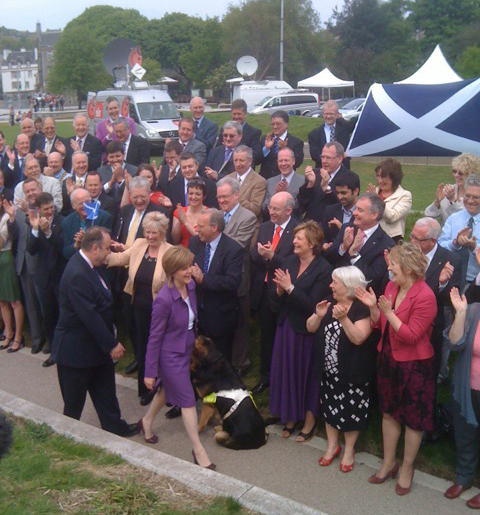The politics and nuances of the new independence
Unfortunately, but perhaps not surprisingly, a lot of the commentators and the politicians at Westminster are some way behind the curve on this issue.
They are debating, fighting and challenging constitutional arguments that were current a decade ago but which are not topical today.
To be fair, they are not the only ones. There are Scottish nationalists too who perhaps do not realise that Alex Salmond has nipped out during the night and shifted the goalposts. The First Minister’s view of Scottish independence is, now, radically different to the one the SNP espoused in the early 1990s and some way from that being punted by the SNP even a few years ago.
The first to highlight this was SNP policy adviser Stephen Noon. If anyone in the nationalist movement doesn’t know who Mr Noon is, they should do: he is the brains at the heart of the SNP in government and if he suggests, as he does, that the SNP is pursuing a different, softer approach to independence then that is indeed what is happening.
Mr Noon wrote a blog on Tuesday, Stronger Together as Equals, making it clear that “separatism” is not on the SNP’s agenda and that everything was about “partnership” with England.
Angus MacLeod then delved a little deeper in the Times yesterday, using an analysis column to explain what senior SNP sources had told him: that Scottish independence was entirely compatible with some form of set payment from the Scottish to the English Government, covering such items as defence and the diplomatic service, which would be retained for the UK and run by London, as they are now.
The Professor James Mitchell of Strathclyde University put even more meat on the bones of this new, less aggressive form of independence. He interviewed 80 senior nationalist politicians, at length, to discover what they meant by independence.
Quoted in the Times today, Prof Mitchell said: “I was surprised by just how pragmatic the senior members were in terms of what they understood independence to mean. I would describe what they are thinking about as being much more of a confederate arrangement within these islands than the traditional concept of independence.”
It is this quasi-federal nature of the relationship between Scotland and England which seems to have become the focus of the SNP’s new approach.
At its heart, this new approach would involve the handing upwards of certain powers, over defence, macro-economic management and foreign affairs to run on behalf of both countries, as is done now.
The major difference is that this would be at the discretion of the smaller country which would hand over money to pay for them, not have that money held back – as is the case at the moment.
“One senior figure said to me that provided Scotland had the right to pull out of any sharing arrangement at any time, he would be quite happy to share a whole range of services,” Prof Mitchell told the Times.
This does tend to reinforce the view that independence and unionism are not poles apart and separated by an ideological divide. Rather that extreme unionism and extreme nationalism are at opposite ends of a spectrum with many different (and subtly nuanced) variations dotted out between them, ranging from the current devolution settlement, through fiscal accountability, fiscal autonomy, federalism, independence-lite to old-fashioned, complete separatism.
The key message from Mr Noon and highlighted with academic rigour by Prof Mitchell suggests that Alex Salmond’s version of independence has shifted along this spectrum for both practical and electoral reasons.
He knows that when the Scottish people come to have their say on the issue of independence, they are much more likely to vote for something that retains some kind of link (however tenuous) to the old United Kingdom than complete separation.
It is also now clear that many of the unionist commentators and politicians in London have yet to catch up with the new arguments and, unless they do, they will be left behind and stand little chance of winning the real battle when it is launched in earnest by the referendum bill.






 Yesterday’s announcement that the SNP have signed a contract for the additional Forth Road Bridge with FCBC was denounced as an election gimmick by the Scottish Greens, and the party pledged to put cancellation of the contract on the table for any post-election talks.
Yesterday’s announcement that the SNP have signed a contract for the additional Forth Road Bridge with FCBC was denounced as an election gimmick by the Scottish Greens, and the party pledged to put cancellation of the contract on the table for any post-election talks. In a major new campaign initiative, First Minister Alex Salmond yesterday launched the Scottish Futures Fund – a £250 million fund, paid for by savings secured by the SNP Government from the Forth Replacement Crossing project.
In a major new campaign initiative, First Minister Alex Salmond yesterday launched the Scottish Futures Fund – a £250 million fund, paid for by savings secured by the SNP Government from the Forth Replacement Crossing project.
 The Scottish Conservatives yesterday promised to introduce locally elected police Commissioners. Speaking outside Selkirk police station, John Lamont, Scottish Conservative Justice Spokesperson and candidate for Ettrick, Roxburgh & Berwickshire, said:
The Scottish Conservatives yesterday promised to introduce locally elected police Commissioners. Speaking outside Selkirk police station, John Lamont, Scottish Conservative Justice Spokesperson and candidate for Ettrick, Roxburgh & Berwickshire, said: